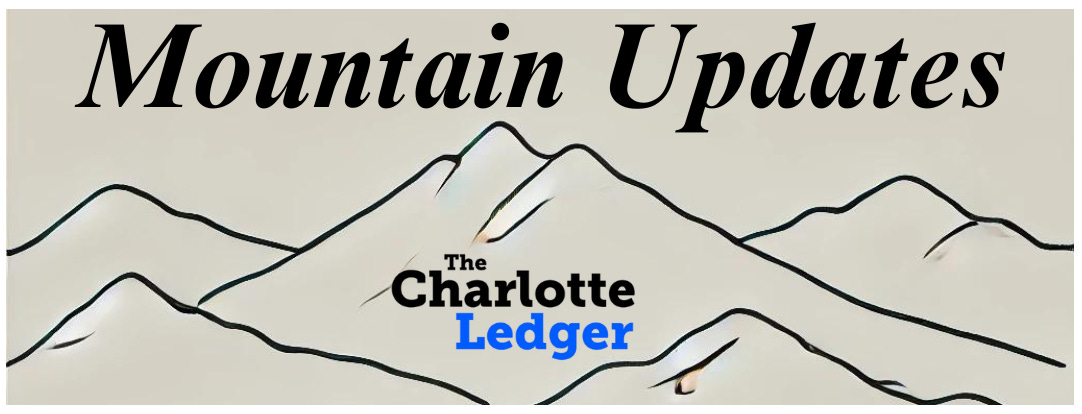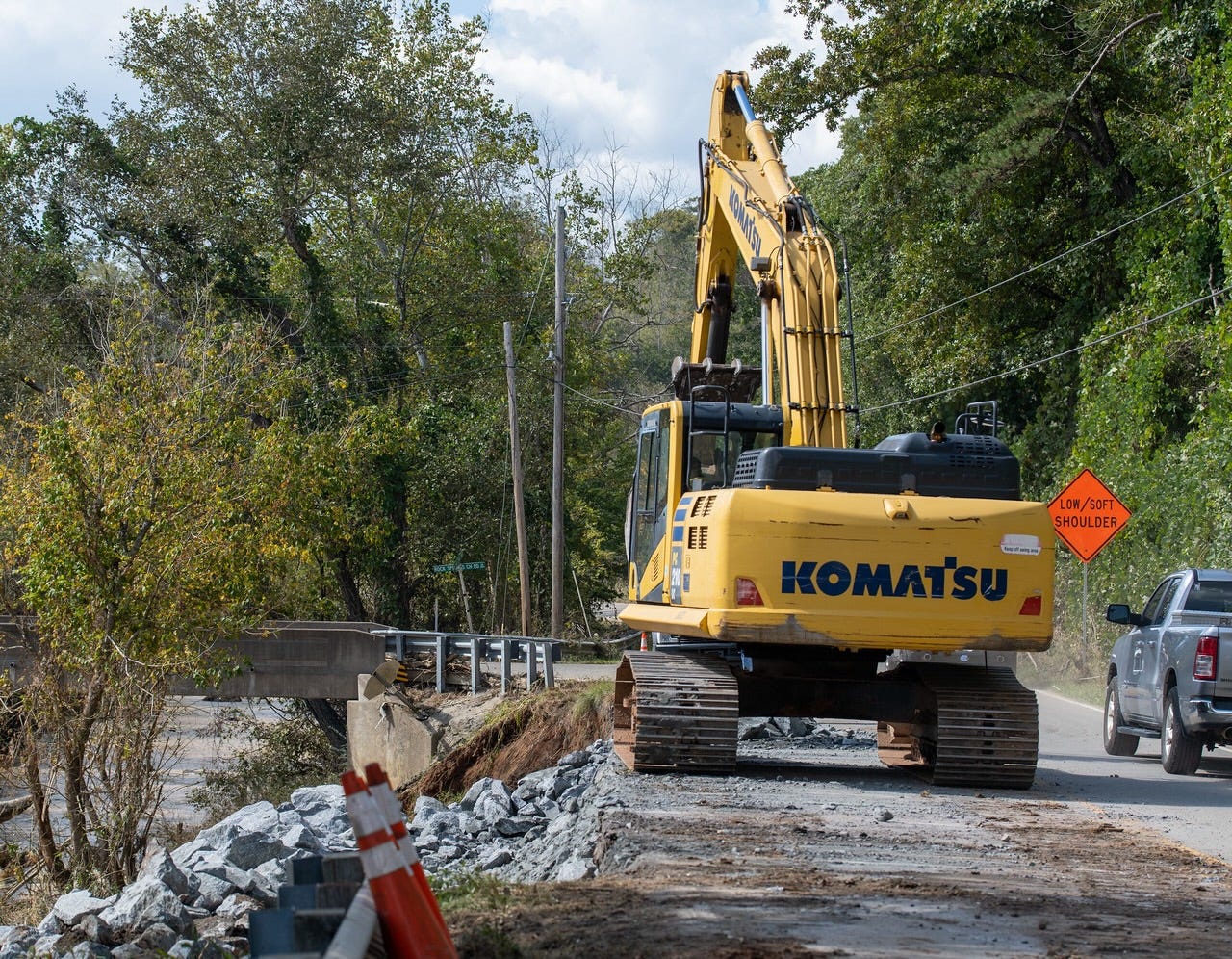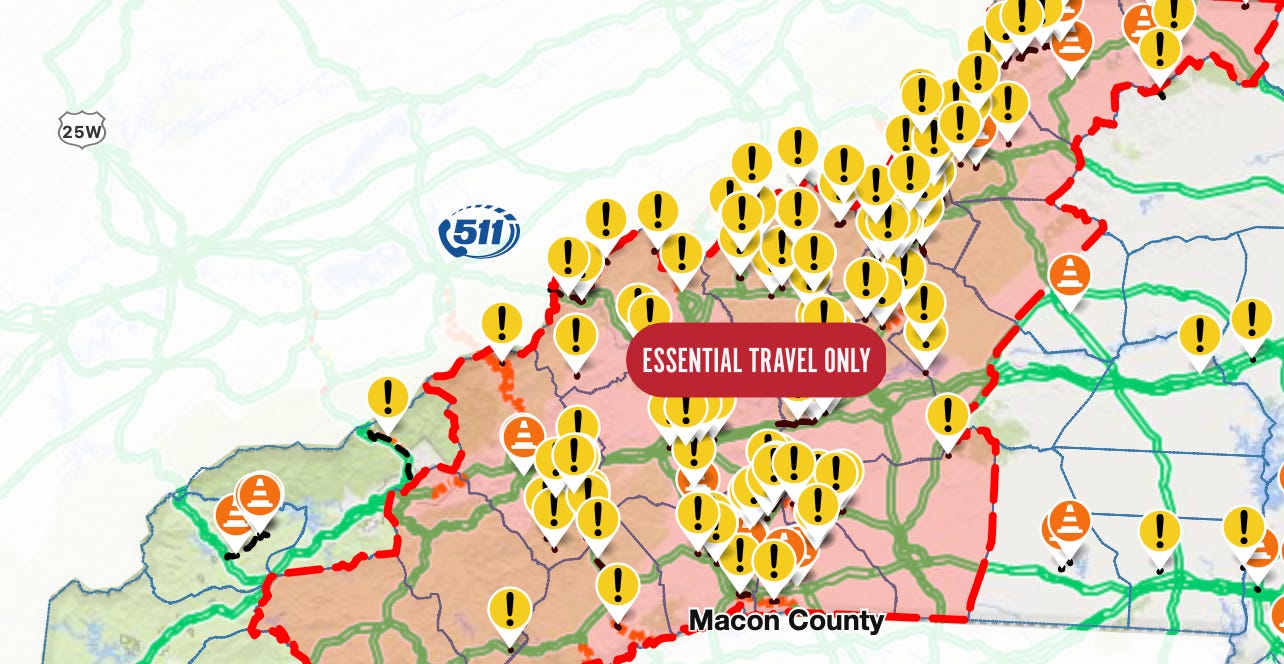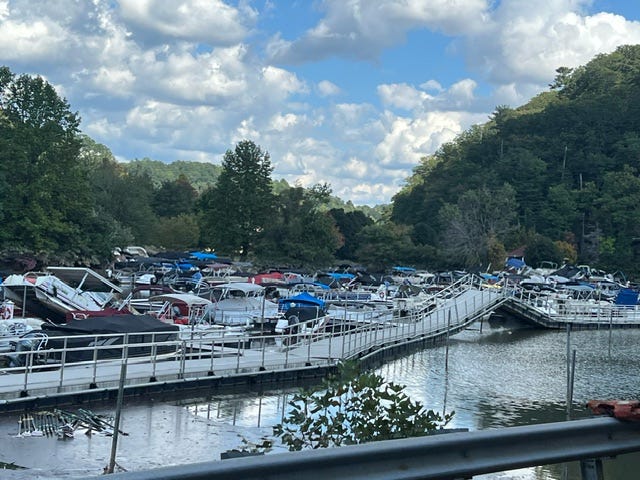Fixing all of those washed-away roads
Plus: Effect of suspended mail delivery; Biltmore details damage; VP visits; Bear warnings; Sheriff blasts misinformation; Relief helicopter has Lionel Richie's face
You’re reading Mountain Updates, a free pop-up newsletter from The Charlotte Ledger examining the crisis and recovery in the N.C. mountains. Ledger subscribers can add Mountain Updates on their “My Account” page.
Sign up for free:
About 600 roads remained closed in Western N.C., NCDOT says; $100 million announced by feds for initial repairs
NCDOT crews from across the state are “working around the clock” to clear and repair damaged roadways caused by Hurricane Helene, says N.C. Department of Transportation. (Photo courtesy of N.C. Department of Transportation)
Good afternoon. It’s Tony Mecia, filling in for Lindsey, who is off today.
The storm created plenty of challenges, and one of the biggest is how to fix all the roads that either no longer exist, had portions swept into the water or are blocked by mudslides or downed trees.
Without roads, it’s tougher to get aid in — which is why in some cases, supplies are being hiked in or delivered by mule or helicopter. And closed roads make it tougher for people to get out.
As of Friday afternoon, the N.C. Department of Transportation told The Ledger that it had reopened more than 130 roads in Western North Carolina. But it still has approximately 600 closed roads to go. An NCDOT spokesperson told us that the numbers change every day and that re-established cell service is giving road workers “a clearer picture of the affected infrastructure.”
NCDOT crews have identified 2,600 damage sites, including 265 bridges and 322 culverts.
NCDOT’s DriveNC.gov site shows plenty of closed roads in Western North Carolina.
I talked last week with Tony Lathrop of Charlotte, who serves on the N.C. Board of Transportation, the state panel that helps set state transportation priorities. He said NCDOT is still in the assessment and debris-removal phase and added: “All the damage will be repaired.”
“Right now, we have a strong cash position,” he said. “We are blessed in that regard. It’s all spoken for many times over already for capital and maintenance work, but in terms of having cash, we are in a good position now.”
He said it’s too early to speculate on the costs, or how NCDOT might pay for it all. In the last few years, NCDOT has encountered a funding shortfall for road projects and has pushed many of them back, as we and other media outlets have reported. Some of the federal and state aid headed this way will help with infrastructure repairs, including roads. On Saturday, the Federal Highway Administration announced $100 million would be made immediately available to NCDOT to repair roads and bridges.
It’s also premature to say what all the mountain road work might mean for other NCDOT projects that are on the books elsewhere in the state.
Rebuilding I-40: One of the busiest roads to be knocked out is I-40, which is closed in each direction near the Tennessee line. It carries 26,000 vehicles a day and is likely to be closed for a long time, the Raleigh News & Observer reported last week, and crews are already working on a plan to shore it up and rebuild it. The paper said that stretch through the mountains took 15 years to build and that when it opened in 1968, N.C. Gov. Dan Moore is reputed to have said: “The genius of modern man has shown itself to be superior to the adversities of nature.”
A little over a week ago, nature had something to say about that.
Here are some of the latest headlines coming out of Western North Carolina:
Mail suspended: The U.S. Post Office has suspended mail service to addresses in ZIP codes starting with 286, 287, 288, and 289. The lack of mail delivery could pose problems for residents who receive medication by mail. (The Assembly)
Port strike could delay relief supplies: The three-day port strike that ended Thursday night could hamper recovery efforts. The strike caused some shipments that would have come to ports such as Wilmington to be rerouted to the West Coast, which means that building materials and other goods needed for hurricane relief could take longer to arrive. (Carolina Public Press)
Biltmore damage: The Biltmore Estate, one of Western North Carolina’s biggest tourist draws, is expected to be closed until at least Oct. 15. Parts of the 8,000-acre estate experienced significant flooding and wind damage, the Biltmore said in a social media post. It attracts 1.7 million visitors a year. (WFAE)
Visit from VP: Vice President Kamala Harris visited North Carolina on Saturday to be briefed on the storm damage. She met with Asheville’s mayor, and the two discussed Asheville’s needs and how to support small businesses. (Asheville Citizen-Times)
Beware of bears: The N.C. Wildlife Resources Commission warned that it is “receiving reports of an increase in human-black bear interactions” as a result of hurricane damage because of the prevalence of trash and unattended donations of food. It recommended keeping doors and windows locked and placing trash where bears can’t easily get to it. (N.C. Wildlife Resources Commission)
Lionel Richie's face on supply helicopter says ‘Hello’: The tail of a National Guard unit’s Chinook helicopter that is delivering supplies to N.C. flood victims has a sketch of singer Lionel Richie. The helicopter’s call sign is “Night Long,” a reference to the 1983 Richie hit “All Night Long.” A member of the Iowa flight crew says the image makes people laugh, “especially if they’re older,” and that it started as a “morale thing” in 2011. (Charlotte Observer)
If you find this email newsletter useful, share it with a friend:
Photo of the day: Boats stacked up at Lake Lure’s marina
The scene late last week from the Lake Lure Washburn Marina, where boats were smashed into each other as the result of higher lake levels. (Photo courtesy of Brian Bittle)
Quotable: Haywood County sheriff blasts online misinformation; ‘Get off Facebook’
Haywood County Sheriff Bill Wilke, at a news conference Friday, on the topic of online misinformation, as quoted in The Mountaineer of Waynesville:
The rumors and the misinformation are being generated by a very small number of people. I’m focusing on the people who are wearing boots and gloves and doing muck-outs and spending, in some cases, 18 hours a day working just to find family heirlooms that have been lost. My effort is on them. I’ve been out in the field, and I’ve seen what’s happening, and those voices are of no concern to me, and I’m asking the residents of this county to focus on what’s good. …
You’re harming the morale and the efforts of people who are out there putting themselves in harm’s way to help others who have been impacted. You’ve got residents in this county without power, without immediate access to transportation, food or water, who, without any regard for their own safety, go next door to their neighbor’s house and do things like help them find their cattle. …
I would encourage the good residents of Western North Carolina to turn that garbage off. I have very little patience for it. Get off Facebook, and get out there in a pair of boots and put on a pair of gloves and get to work.
Watch: When a wall of water came surging down the hill
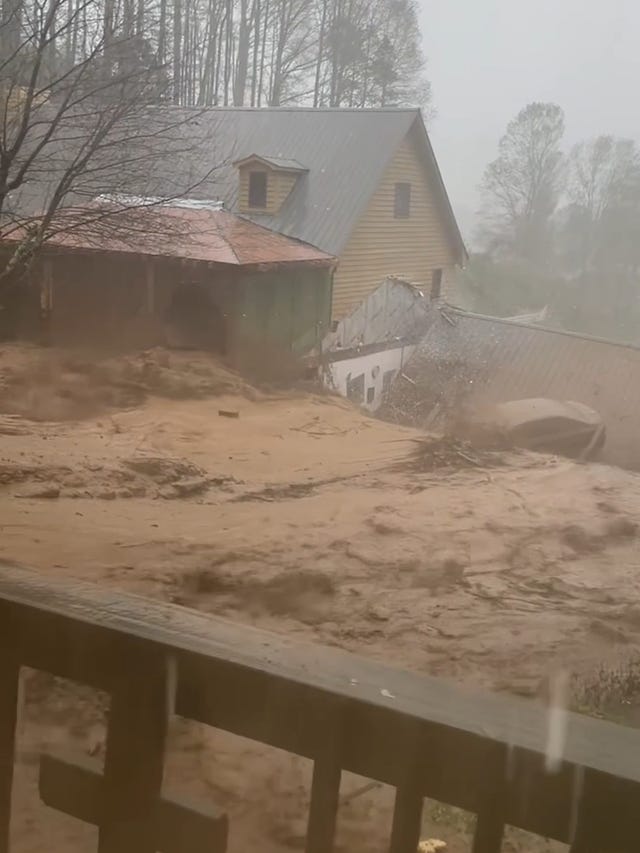
 Tiktok failed to load.
Tiktok failed to load.Enable 3rd party cookies or use another browser
How to help
Many organizations have deployed groups across the region, tasked with distributing food, water and supplies. You can donate to their efforts at the links below.
Hearts with Hands, a local disaster relief organization, has a donation page to provide food, supplies and water.
United Way of North Carolina has established a fund to help residents affected by the flooding.
The American Red Cross is accepting donations to help residents in the Southeast.
Samaritan’s Purse, which is headquartered in Boone, is scheduling volunteers to help with debris cleanup.
Operation Blessing has a donation page to provide food, supplies and water.
—
Tony Mecia is The Charlotte Ledger’s executive editor. Reach him at tony@cltledger.com.
Need to sign up for this e-newsletter? We offer a free version, as well as paid memberships for full access to all of our local newsletters:
➡️ Opt in or out of different newsletters on your “My Account” page.
➡️ Learn more about The Charlotte Ledger
The Charlotte Ledger is a locally owned media company that delivers smart and essential news through e-newsletters and on a website. We strive for fairness and accuracy and will correct all known errors. The content reflects the independent editorial judgment of The Charlotte Ledger. Any advertising, paid marketing, or sponsored content will be clearly labeled.
Like what we are doing? Feel free to forward this along and to tell a friend.
Social media: On Facebook, Instagram, Twitter and LinkedIn.
Sponsorship information/customer service: email support@cltledger.com.
Executive editor: Tony Mecia; Managing editor: Cristina Bolling; Staff writer: Lindsey Banks; Business manager: Brie Chrisman




